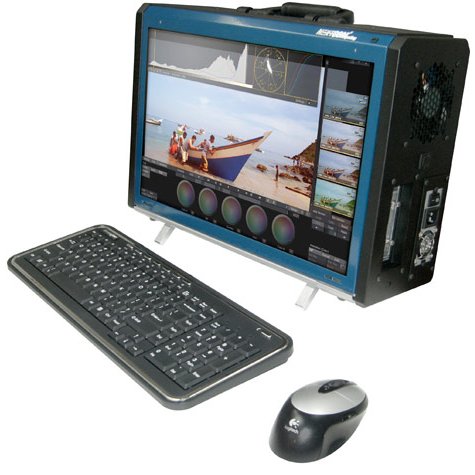
Posted on Tuesday, January 11 2011 @ 8:21 CET by Thomas De Maesschalck
Next Computing introduced a new Sandy Bridge based edition of its Radius all-in-one portable workstation. This system is basically a compact desktop computer with a 17" screen integrated into the side panel and a handle on top for easy transporting.
NextComputing, a leading provider of portable and small footprint workstations and servers, announces the addition of the 2nd Generation Intel™ Core® processor family to its Radius all-in-one portable workstations. By adding these latest processors, based on Intel's newly redesigned micro-architecture, code-named "Sandy Bridge", NextComputing's customers can expect to achieve greatly improved performance for any processing-intensive application, due to numerous major design enhancements at the chip level.
Based on Intel's 32nm process, the "Sandy Bridge" architecture represents the next major step in the evolution of Intel micro-architecture. Users can expect better performance at higher clock speeds while consuming less power than the previous generation Intel Core processors. These 2nd Generation processors also include an on-die graphics processing unit (GPU), allowing the processor to adjust its performance and power consumption depending on an application's needs for general purpose processing, graphics, or both. In addition, features such as optimized Intel Turbo Boost and Intel Hyper-Threading technology offer intelligent core clock-speed throttling and multi-threading capabilities respectively, giving power users a significant performance boost for their most demanding applications.
NextComputing specializes in building customized portable computing solutions for power users in several key industries who require the highest-end performance in easily transportable systems. The company's Radius series portable workstations feature high-performance Intel Core i7 processing, multiple full-length / full-height PCI Express slots, and multiple terabytes (TB) of internal and removable storage – all in a compact, briefcase-sized system with integrated display.
Mobile professionals in several key industries stand to benefit from 2nd Generation Intel Core series processors, including:
* Test and Measurement – Applications like network traffic inspection and generation can achieve faster time-to-solution by processing and analyzing network data more quickly and efficiently.
* Military and Intelligence Operations – Mission critical intelligence in its various forms, whether full-motion video, RADAR, or satellite imagery, can now be analyzed and reported on faster, allowing military and homeland security personnel to more actively respond to threats.
* Video Editing – Manipulating and encoding High-Definition (HD) video are now faster, leading to increased productivity when working with complex projects.
* Digital Content Creation – Rendering lifelike computer-generated images and scenes is now faster, resulting in a more interactive creative process
"NextComputing answers the needs of professionals who need the power of a desktop or server system in a smaller, more transportable package for working out in the field," says Bob Labadini, President and CTO of NextComputing. "For years we have found innovative ways to deploy Intel micro-architecture in unique, portable designs. Now with the inclusion of the 2nd Generation Intel Core processor family in its Radius series portable workstations, our customer base of mobile power users can work even faster in any of their demanding applications."

